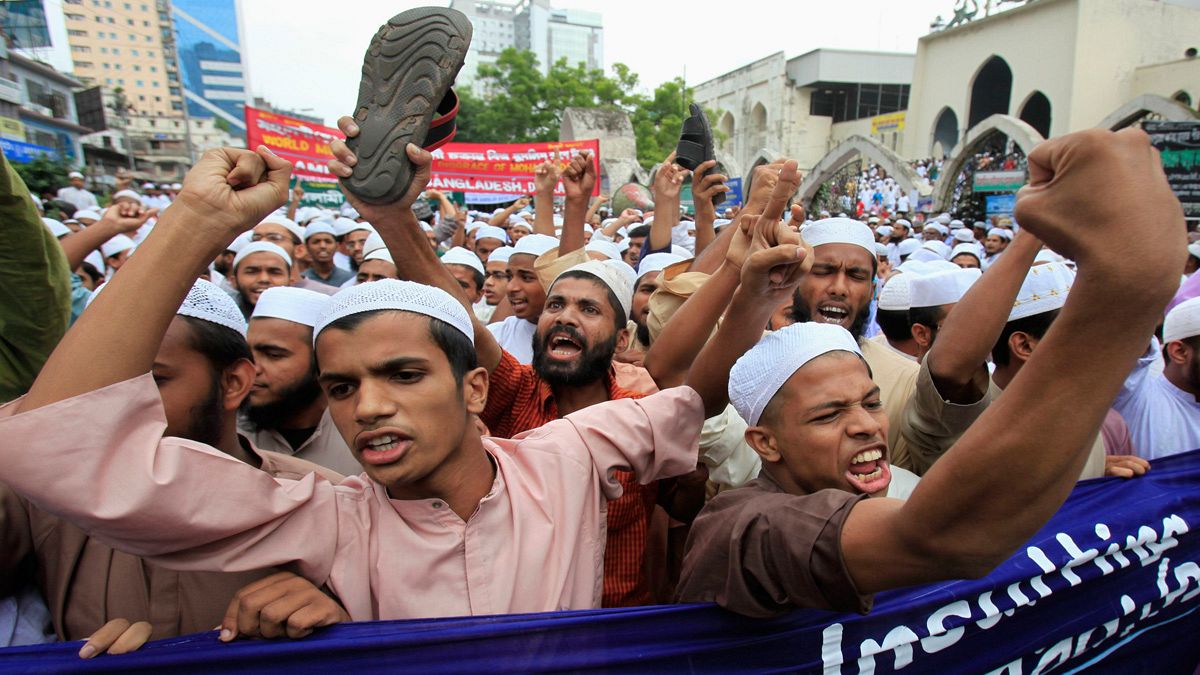Violent protesters in Muslim cities around the world have been blaming the United States for a film made there which they say insulted the Prophet Mohammed.
Clips of the movie, called ‘Innocence of Muslims,’ had been posted on YouTube, and portrayed offensive behaviour. Many Muslims consider any depiction of the founder of their religion as blasphemous.
The anger first turned violent on Tuesday, when four Americans at diplomatic premises in Libya were killed.
NATO forces in Afghanistan went on higher alert.
Brigadier General Roger Noble said: “We responded immediately on hearing the violence overseas and warned the ISAF force (International Security Assistance Force) and international community, and have had discussions with ANSF (Afghan National Security Forces) about the potential of violence in the coming days.”
In February this year, a Koran-burning incident touched off several days of rioting and attacks on US troops after local workers found the books, considered sacred, had been incinerated at the Bagram base north of Kabul.
Dozens of people were killed in the violence that spread across the country.
A threat to the Koran in the United States were made by Pastor Terry Jones of Florida in 2010; he carried it out last year, burning a book along with portraits of the prophet.
Following that, foreign UN workers were among a score of people killed in rioting in Mazar-i-Sharif and Kandahar in Afghanistan.
The publication by a Danish newspaper in 2005 of cartoons of the Prophet Mohammed sparked deadly riots in Muslim countries in the Middle East, Africa and Asia in which at least 50 people died.
In the protests triggered by the film ‘Innocence of Muslims’, governments have both demanded that diffusion of any part of it be blocked, and reinforced the protection of embassies which are focal points of anti-western hatred.
We spoke to Malek Chebel about this, an anthropologist specialising in Islam, and a Koranic translator.
Sophie Desjardin, euronews: “We’ve seen that huge and often violent reactions to the publication of caricatures, satires or provocations relating to Islam are not new, and the fallout is often the same. This film called ‘Innocence of Muslims’ appears to be in bad taste and of bad quality – clearly a provocation, with no historic or analytical grounding. So, why has it aroused such a reaction?”
Malek Chebel: “Perhaps it is just because it is too bad in reality, and at the same time the mediocre nature of the film carries a sort of contempt for the Prophet of Islam, I think, in the perception of Muslim people.”
euronews: “Looking at film caricatures of Jesus, we can cite Martin Scorcese’s ‘Last Temptation of Christ’ or, in a more satiric vein Monty Python’s ‘Life of Brian’, there has never been such an outcry from Catholics on the scale of what we are witnessing today. Why is there such a difference?”
Chebel: “Because Catholicism is far older, historically, chronologically, and in addition to that the Catholic religion has in a way been secularised, and has been for a long time. There were religious wars within Catholicism itself, which was never the case for Islam, on top of which we have to consider that Islam is coming out of a rather troubled period, of colonisation and decolonisation, and it is looking for itself on the existential level, looking for a more long-term position.”
euronews: “We’ve seen in practical ways for several years that we can’t make fun of Islam or criticise it. Is there room for freedom of expression?”
Chebel: “In fact, we can’t criticise the Prophet, who is the model, if you like, with which people – believers – identify. They have an almost physical link with the Prophet Mohammed. But on the other hand you can criticise Islam. Islam is criticised every day, within an acceptable measure. Now, with this film, it is a systematic denigration, and that is how it is perceived by masses of Arabs who lack the critical distance that permits one to understand the history of the image, and its strength in the West. They don’t have this removal, and therefore they take at face value, if I can say, any attack on Islam, and especially the Prophet Mohammed.”
euronews: “What we know about the director or the actors behind this film is still not very clear. We know it had the support of the renegade pastor Terry Jones, who sprang to notoriety last year when he burned the Koran. These extremists are not backed by the US authorities of course. But do people believe the opposite in Arab countries?”
Chebel: “They don’t make the distinction between officialdom in the West, the political elites for example, and the people in the West, in particular anti-liberals, because in Islam this distinction doesn’t exist, therefore everything coming from the West is all lumped in together as the West.”
euronews: “The Arab world has been going through a mutation since the Arab Spring; does that explain this? Is there a particular context fanning the flames?”
Chebel: “I don’t see this as a direct context. There is no causality between the Arab Spring and this reaction. To support this, there were other reactions, such as with the cartoons, or the chador, or minarets, and I don’t see a link. But you are right that freedom of speech is increasing, and there are no longer internal dictatorships – there is a real freedom of expression, because there is no longer the repression of the Mubarak era and Ben Ali and all the dictators.”
euronews: “Can we expect worse in the days or weeks to come?”
Chebel: “I think that the fundamentalists, the Salafists, the people who hate the West, the bosses who under the Ben Ali or Gaddafi or Mubarak systems had serious privileges and now don’t are going to want to avenge themselves one way or another, and will therefore try to stir up hatred among small groups that are feeding these reaction movements.”
